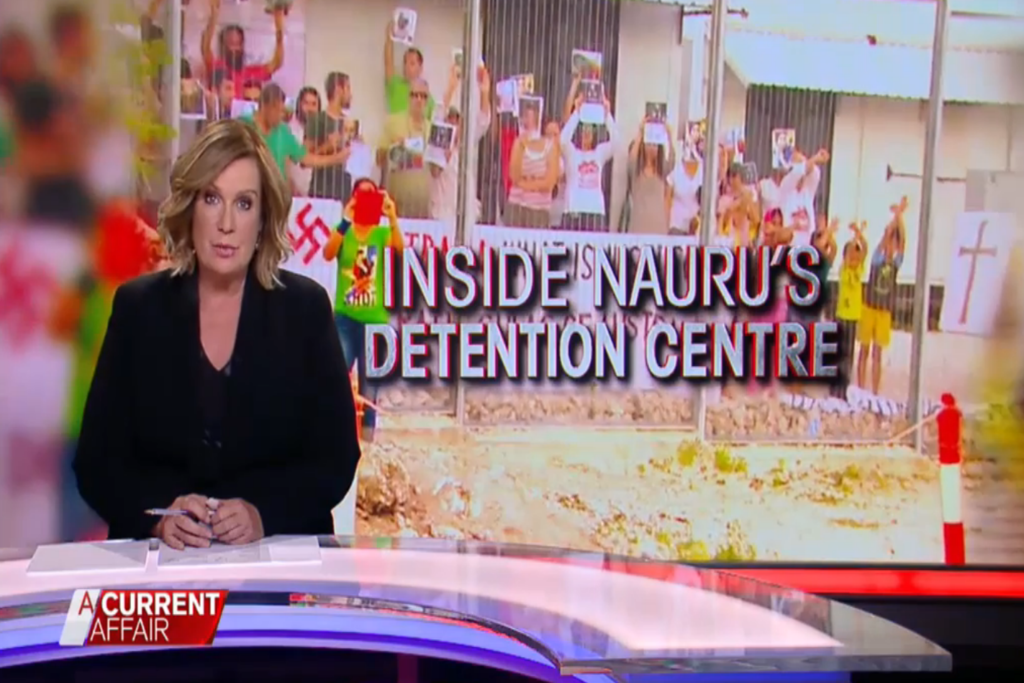Last Night’s ‘A Current Affair’ Story On Nauru Should Make You Angry
It’s absolutely ridiculous that only two journalists have been granted access to Nauru in the past three years

It was promoted as “the story that will stun Australia”, but A Current Affair‘s investigation into Australia’s offshore detention regime operating on Nauru didn’t bring us anything new. Which is pretty disappointing considering the exclusive and “unprecedented access” (according to them) they were provided by the Nauruan government.
Look, it wasn't the best report on #Nauru (too many claims went unchallenged) but it still showed state of camps & asylum seeker's stories..
— Kemal Atlay (@kemal_atlay) June 20, 2016
Earlier this year the government of Nauru cancelled all visitor visas for Australian citizens. Journalists have to pay $8,000 to have their visa processed and even then there’s no guarantee they will be allowed to visit the country. In fact, before A Current Affair (ACA) was granted access, only one Australian journalist had been given a visa: The Australian‘s Chris Kenny. Even a former federal government health minister had her visa application rejected.
It’s a very big deal that ACA were granted access. So what did they find out?
–
What Did A Current Affair Actually Tell Us?
Despite concerns from refugee advocates in the lead-up to the program that the episode would be a hatchet job on asylum seekers, the report was fairly even handed. ACA journalist, Caroline Marcus, spoke to a number of asylum seekers, as well as those who had been successfully granted refugee status, local Nauruans and Nauruan government officials, to try and paint a picture of what life on the tiny Pacific island is like.
For the refugees, at least, the answer is bleak. More than 700 refugees live in purpose-built detention housing facilities behind security fencing. The houses are a recent upgrade from the tents they were previously forced to live in. While ACA tried to portray the properties as somewhat luxurious (they even had fridges!) it was pretty clear the accommodation arrangements for refugees are quite humble. It’s also worth pointing out that these new “luxuries” (basic white goods) have only come after the refugees lived in tents for up to three years. Refugees are “free to come and go” though they face security checks each time they leave and enter their housing compounds.
One refugee ACA spoke to said that she felt unsafe on Nauru as a single woman and had gotten married in order to protect herself. Independent reviews have found that sexual assault is common across Nauru.
Refugee tells @carolinemarcus9 she married to feel safe #Nauru This is cos #LNP #Labor policies deliberately send women to danger @awswn_
— Wendy Bacon (@Wendy_Bacon) June 21, 2016
Thirty-seven children reside in detention on Nauru. The older kids have the option of attending the local schools, but all of the children who spoke to ACA detailed experiences of bullying and racism that had made them wary of locals.
A second detention facility houses 300 single male refugees. This facility is nothing more than a permanent detention camp where refugees live in mould-lined tents. One Somalian man, who had been granted refugee status, told ACA he had been waiting for community housing for nearly 3 years.
Other refugees ACA spoke to detailed their experiences with mental health issues, physical health issues, an ailing health system on the island, police who wouldn’t take their assault complaints seriously and experiences of racism with the local populace. ACA attempted to balance these allegations by speaking to the Nauruan President who, unsurprisingly, defended the offshore detention facilities and claimed the refugees were “being looked after”.
ACA claimed that no conditions were placed on them by the Nauruan government, but they did admit that they were escorted by government officials when visiting the detention facilities and speaking to refugees. The report failed to ask any serious questions of Nauruan government officials and just took their well-rehearsed talking points at their word.
Even on tabloid TV, the hopelessness of life on #Nauru is painfully clear https://t.co/PwSkDR4A7x via @smh #auspol #ausvotes #refugees
— Tash (@jouljet) June 20, 2016
–
Why Should We Be Angry?
Despite the fact that the report was more even-handed and far less vitriolic than most people expected (it is A Current Affair after all), the episode has raised a few issues that deserve far more scrutiny and attention in the lead-up to the federal election.
It’s absolutely ridiculous that only two journalists have been granted access to Nauru in the past three years. The suggestion that the Australian government has nothing to do with who is given access to Nauru is a joke. We fund the detention centres to the tune of $1 billion a year, we send the refugees to Nauru and we are responsible for their wellbeing. Preventing journalists from freely accessing the detention centres, uninhibited by government officials, makes a mockery of press freedom.
We should not have to rely on A Current Affair to find out about the real, human impacts of our refugee policy. Something ACA didn’t do was speak to the doctors and social workers who have treated refugees on Nauru. That’s because it’s illegal for staff who have worked in detention centres to speak to the media, thanks to laws passed by the Coalition and Labor in 2015.
These detention centres are paid for using our money. It’s our policy that sees these refugees languish in mould-ridden tents for years. It’s our policy that prohibits desperate people from ever settling in Australia, something even John Howard allowed. The fact that Australian journalists are unable to independently report on our policy in our detention centres is a great shame, and deserves far more attention in the lead-up to election day.